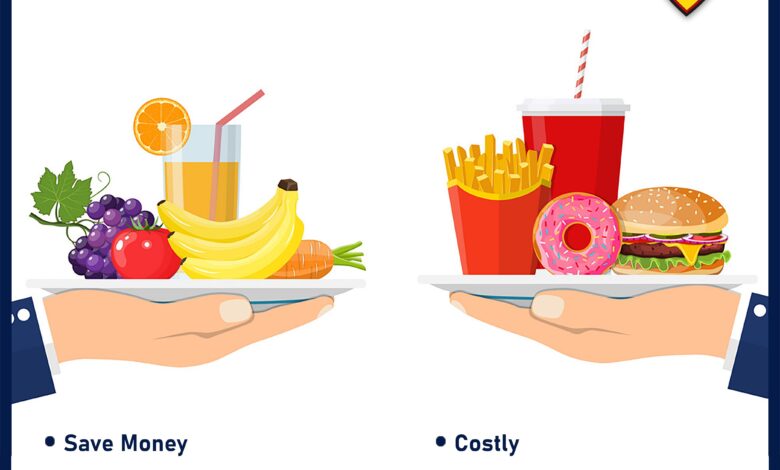Healthy Food Vs Junk Food

When it comes to food, there are a lot of people who prefer healthy foods. They do so because they believe it will help them stay fit and maintain a proper diet.
However, they may not realize that it costs more to purchase healthy foods than their unhealthy counterparts. This can make it difficult for many people to follow a healthy diet.
1. Nutrients
Healthy foods are high in nutrients like vitamins, minerals, fiber, calcium, and potassium. They also contain antioxidants to protect your health from free radicals that may cause cancer.
Junk food, on the other hand, is low in essential nutrients and contains high amounts of kilojoules (energy), salt, sugar, and fat. Often called “empty calories”, junk foods are not good for your diet and should be avoided.
Nutrient deficiency is a common problem among people who consume junk food regularly. In fact, over 2 billion people worldwide are estimated to be deficient in key vitamins and minerals.
Eating a healthy diet is important to maintain a healthy weight and reduce your risk of chronic diseases such as heart disease, diabetes and obesity. It can also boost your mood and energy levels.
2. Taste
The taste of food plays a vital role in determining whether it is healthy or unhealthy. Junk food is mainly processed and contains high amounts of saturated fats, sugar and lack of essential nutrients.
In contrast, healthy foods are a good source of vitamins and minerals that support the body’s natural processes. They also contain dietary fiber, which helps you feel full and satiated.
Healthy foods can be cooked in a number of ways to make them delicious and nutritious. For example, berries are delicious and full of antioxidants that can boost brainpower, fight inflammation, and lower cholesterol levels. Seafood is another delicious and nutrient-packed food option, and can help maintain your eyesight, rejuvenate skin, and reduce the risk of depression.
3. Oils
Oils are an important part of healthy eating. They help you feel full and add flavor to your meals. They also contain beneficial nutrients and are great for your heart and brain.
Choosing the right oils can make all the difference in your health, so it’s important to know which ones are good for you and what you should avoid. Here’s how to choose the best ones for your diet:
A key factor to consider when selecting a cooking oil is its fat profile and level of refinement. Refined oils have been treated with high heat and chemicals, which can degrade their healthful nutrients and phytochemicals.
The good news is that there are many healthier options on the market. Some of the best include olive oil, coconut oil, and canola. These oils are all rich in monounsaturated fatty acids (MUFAs) and polyunsaturated fatty acids (PUFAs), which can help you reduce your risk of disease.
4. Calories
If you want to stay within your calorie limit and keep yourself in good health, the first thing to know is that there are different types of calories. Some are good for you, while others are bad.
Healthy food is rich in nutrients that are essential for your body to function properly. These include vitamin D, fiber, calcium, potassium, and more.
Junk foods, on the other hand, are high in calories but they don’t provide the same nutrition. In fact, junk foods can be deficient in key vitamins and minerals.
British fitness blogger Lucy Mountain wants to change this and has put together a series of visual comparisons to show just how much difference there is between healthy food and junk food. She shows how healthy options like apples, muffins, ice cream and more stack up against the empty calories found in chips, chocolate bars and burgers.




